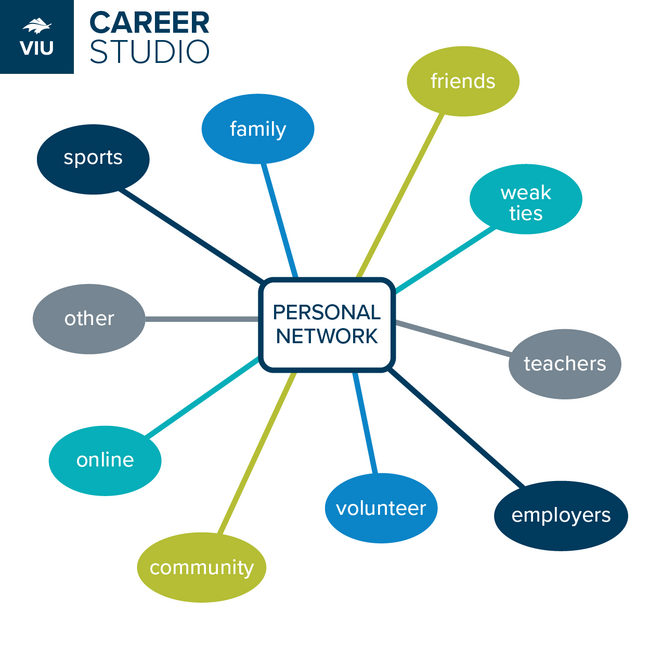
Job Search Strategies
As you create your career action plan, it is important to consider which methods and sources you will employ in your job search.
Here is a quick list of ways to take charge:
- Make a list of companies you want to work for, and watch for employer notifications
- Map out your sphere of influence and connect with your network
- Create a LinkedIn profile, utilize social media
- Hold an informational interview
- Uncover the hidden job market
- Target your job search and your marketing materials
- Stay on top of industry news, trends and related associations
- Line up your references, ask for referrals
- Master your elevator pitch
- Connect with staffing agencies
VIU Career Studio offers workshops on Job Search Strategies, Social Media and LinkedIn, and Labour Market Information. View and register for upcoming events.
Job Boards
- AcademyHire - Business Faculty Jobs
- AngelList Talent - Startup jobs
- BC Alliance for Arts & CultureBC Tech Jobs
- EngineeringCareers.ca - Engineering Institute of Canada
- GoodWork Canada's Green Job Site
- Go2HR - British Columbia Tourism and Hospitality Jobs
- Healthcare Jobs in Canada
- HigherEdJobs
- Human Resources Jobs
- MediaJobSearch Canada
- BC Trades Job Board
- Upwork - graphic design jobs
- 86 Network - restaurant and hospitality jobs

Resumes and Cover Letters
Resumes
A resume is an informational document used to introduce skills and qualifications to an employer. Your resume is a historical record setting out demonstrated accomplishments achieved in your career and education. Your resume is part of your "marketing package" and is representative of your qualifications matching a specific role.
Here are some tips for building a solid resume:
Make sure to include:
- Contact information
- Professional Summary
- Skills/Accomplishments / Industry-specific extras
- Work experience
- Education
- Volunteer experience
What NOT to include:
- Social Media Profiles not relevant to work
- A “Career Objective” section
- A “References” or a “References Available upon Request” section
- Pictures, tables, graphs, or charts
- Gender, age, or marital status
- Fraud, padding, and exaggeration
- Clichéd words
Note: A well-targeted resume may get you the interview, but you will be responsible for convincing the employer you are the right person for the job!
If you're interested in a 15-minute resume critique then Log In to Experience Hub, go to Career Studio, then Appointments to book your session.
Please email us if you have any questions.
Cover Letters
Is a Cover Letter different than a Resume? Is it really necessary? Yes and yes!
Cover Letters can be hard to write, it's true. Your cover letter is an opportunity to expand on your skills and qualifications for the role differently than you did in the resume. Watch your sentence structure. Don't start every sentence with "I". Do not start your cover letter with "My name is..."
A cover letter is an opportunity to build an "emotional connection" with the employer through a professional, conversational document that highlights your written communication skills. Tell the employer why you're interested in working for them, and demonstrate how you fit the culture by sharing what resonates with you about their organization. Show some personality, but remain professional in all instances.
Here are some tips to make your cover letter shine:
- Use a standard business letter format
- Use a non-decorative font (size 10 - 12)
- Keep it to one page
- Write a separate, tailored letter for each job application
- Make your application stand out with a consistent marketing brand (use a header that emphasizes your name and contact information). Use the same header for the cover letter and the resume
- Address the hiring manager by name if possible
- Open with an attention-grabbing first paragraph
- Use STAR stories to share additional skills you did not elaborate on in the resume
- Ensure that you have fulfilled the company's application requirements (include all information requested, attach all required documentation and follow all submission instructions).
- Finish your cover letter with a professional salutation such as:
- Sincerely
- Best
- Regards
- Respectfully
Note: It is important to sign your cover letter; you may e-sign if you are sending it online
References
When an employer decides to ask for references, it's an indication that they are considering you for the role and will now take the time to collect more information to solidify their decision. Selecting the right people to provide a professional reference is critical. Consider the following:- Ask permission. Speak to your references well in advance and confirm that you have permission to share their contact information. Tell them you are actively applying, share your resume if they are interested and explain what you hope they can provide to the employer.
- LinkedIn—If your reference is active on LinkedIn and you have a profile, ask if they will endorse you or provide a reference on LinkedIn. Verify the best contact information for the employer to contact them directly.
- Select your references carefully. Choose people who are interested, engaged and will endorse your strengths and contributions enthusiastically.
- Choose the appropriate number of references. Typically an employer will request that you provide 3 or 4 people that know you professionally and have worked with you in the past. If possible include the name of your former supervisor or senior representative from your most recent employer.
- Communicate! Help your references understand the position and the reasons you are interested in the position. Indicate the type of information and examples that you would like them to emphasize with the employer. Ask them to provide feedback after they have spoken with the employer.
Note: Your references can be an excellent source of feedback on the content of your resume. They know you well and can ensure that you have represented yourself effectively, so be sure to obtain their input on your strengths and expertise while creating your resume if they are agreeable.
VIU Career Studio offers workshops on setting SMART goals and writing Resumes and Cover Letters, and how to include references. View and register for upcoming events.

Interview and Networking Skills
Interviews, What's the Point?
The primary purpose of a job interview is to determine a match between the prospective employee and the organization.
This process focuses on three areas:
Qualifications: does the job seeker have the necessary skills and experience to do the work?
(Can they do the job?)
Motivation: is the person a self-starter, or does this person need constant monitoring?
(Will they do the job?)
Match with the Organization: will the person match the culture (core values and collective behaviours) of the organization and work collaboratively and productively with the existing staff?
(Will the partnership align?)
PRO TIP: During the interview, candidates are evaluated by the organization. The candidate should also be evaluating the employer with career goals in mind.
Networking
Networking is key when exploring opportunities for employment and connecting with potential employers in the hidden job market.
Did you know it's said that 80% of jobs are not advertised?
Active Job Search - means getting out there, meeting people, and making connections with a targeted networking strategy focused on matching the employer's preferred hiring process.
Passive Job Search - is utilizing online job search tools to find employment.
Searching for jobs online is not enough—get out from behind the computer and make sure you have a strong elevator pitch!
Creating a networking plan starts with reviewing your sphere of influence and creating a map or list of contacts.
This map will get you started thinking about who you might want to add to your list.

When creating a Networking Map, start by making a list of people you’d like to get to know even if you think it might be difficult to meet them. This could include weak ties that you want to get to know better or new people that you want to be introduced to.
Things to consider when building the network map:
- What are my career goals and how can the people listed in my network help me achieve them?
- What value can I bring to the people listed in my network and how can they help me?
- Who else do I want in my network; who can introduce me?
VIU Career Studio offers workshops on Networking/Informational Interviews, Interview Preparation and Mock Interviews, and a STAR Story Cafe to help you answer behavioural-style interview questions. View and register for upcoming events.
